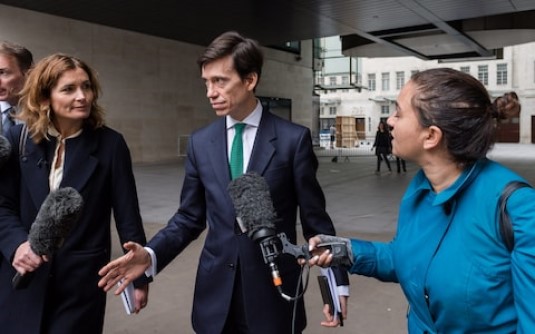
What is it about Stewart though that can bowl (some) people over? He is quite charming, gives off a quiet, unshowy confidence befitting someone from his background (Eton, Balliol College (PPE, of course)), and is obviously posh without coming over as a snob. This permits a strange sort of softly-spoken charisma rooted in the class-bound psyche of many British people. It's as if Stewart is a visitor from planet privilege who, unlike his ghastly colleagues, appreciates the difficulties and challenges of someone without this advantage. This is what he speaks of when talking about a 'Disraeli Young England Conservatism - he knows there are people receptive to a conservatism that listens (or, to be more blunt, affects to listen), and will deal with the politics so they don't have to hear about it. Call it faith in breeding, or the residuum of cap doffing and forelock tugging. The likes of Stewart are born to rule though he's far too polite and self-aware to say it, and there are plenty who would lap it up.
The other advantage Stewart has is his media friendliness. This is more than general amiability and willingness to turn up wherever there's a news crew, it's the common bond he has with the hacks who interview him and take his calls. Most are not as posh as he, though journalism is increasingly becoming a vocation for the well heeled, he nevertheless shares with them staples of centrist media opinion: a superficial social liberalism, a defence of elite privilege, commitment to holy shibboleths (Atlanticism/NATO, market economics, austerity's "necessity", evil Corbyn gulags). And in turn, the press pack see something of their self image reflected back: worldly and informed, unprejudiced but opinionated, adventurous (that colonial-tastic CV!) but cautious. For them like so many liberal and centrist heroes, he is of them and offers enough surface to project their hopes onto. Unfortunately for Stewart's chances, this damns him in the eyes of many Tory activists as a "lefty". If he's the enemy's choice, so the reasoning goes, then it might not be a good idea to back him. Therefore going into the second round of voting Stewart is saddled the Gorbachev problem: feted abroad, but hated at home.
What then is his game? It's exceedingly unlikely he'll get into the final two. And if somehow he does end up there, we're talking Liz Kendall levels of humiliation when it comes to vote share. He's not going to win, even though he's up against a total shambles. And he's not positioning for a job, as he has ruled out serving in a Johnson or any cabinet countenancing a no deal Brexit. According to the latest ConHome podcast, Mark Wallace and Paul Goodman speculate that Stewart is pitching for the leadership of a shade of opinion within the Tories. As Ken Clarke is coming up to retirement, what passes for moderate Toryism is in need of a leading figure and an articulator of ideas. Stewart appears to be such a man. This might irritate the thinning grass roots, but he does serve a purpose: whatever excesses and calamities a Johnson government could lead us into, Stewart is there to remind so-called moderate voters that not all Tories are like that and perhaps one day the time will come when he and his wing take over the reins. It doesn't look probable, but immediate sense impressions are everything in politics. And as leader of such a trend, it leaves him in a good place if the centre-tending sections of the Tories are driven off and they have to start all over again. Also, by establishing Stewart as an erudite and sane Tory politician, over the coming years an influential career as a MP-as-commentator is available to him. It never did Jacob Rees-Mogg any harm.
The Rory Stewart "phenomenon" then is simultaneously an exercise in profile raising, of pitching a different kind of Toryism, of providing moderate cover to Brexit nonsense and racism-enabling gaffs, and of the centrist section of the media intervening in the Tory leadership contest. That someone with politics as duff as his, who went along with and supported Theresa May's withdrawal agreement and has not once raised a voice let alone a vote against this government's attacks on the poorest and most vulnerable, is seen as a saviour and a moderate underscores not just the bankruptcy of the Tory party but Stewart's liberal enablers too.
2 comments:
What's truly bizarre is the number of FBPE centrists who despise Corbyn for 'facilitating Brexit' who are now fawning over Stewart, who is also fully on board with facilitating Brexit--and a harder Brexit than Corbyn and Labour have ever proposed. As if there was any doubt that their ideological hatred of Corbynism has long eclipsed their putative love for the EU...
Rory Stewart is in it for the long haul. He's a Bilderberger.
Post a Comment